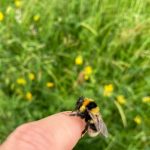The short-haired bumblebee (Bombus subterraneus) is native to the UK and was once widespread across the south of England. Post-1950s its population distribution became isolated and patchy; its decline was almost certainly the result of the loss of the species-rich grassland habitats on which it depends; the species was last recorded near Dungeness in 1988 and was declared extinct in 2000.
CommunityAd spoke to Dr Nikki Gammans FRES (Fellow Royal Entomological Society), Project Manager of the project about the incredible success they have had and their findings.
The project has been running for 12 years, and now has 60 wonderful volunteers working in Romney Marsh, with the aim of reintroducing the short-haired bumblebee, raise awareness of bumblebee and flower meadow declines and increase resident rare bumblebee populations. 2019 marks 10 years of the project and the report of their findings, which they are still working on but are hoping will be scientific publications that can be used to replicate their finding across the UK and Europe.
The project also offers practical habitat management, advising and helping to manage land for farmers and landowners and their findings show they have had an impact on 2,500 hectares across their project area with farmers receiving support and advice on the areas discussed; they also have outreached to 30,000 people through their county shows, fetes, and community projects, engagement in the community, ID events, public walks, talks, stalls, primary school visits and kids’ events.
There have been records of three rare bumblebee species (Bombus muscorum, Bombus humilis, and Bombus ruderatus) in areas not previously seen for between 5-25 years.
The main reason for the decline of not only bees, but insect pollinators is a loss of habitat and it is so important that we change this and help create habitats for bees and other insects to restore our incredibly important ecosystem.
Anyone can help do this by creating habitats in our own back gardens, by ensuring we have different types of flowers in our garden throughout the year, in each season. Whether your garden is shady, damp or in bright sunshine, the free flowers that grow are perfectly suited. Bumblebee Conservation Trust has a superb app called BeeKind, which gives you a wildflower database to help you identify a variety of flowers throughout the year and 2021 is also the year to ‘Bee the Change’ with their fantastic online tools.
PlantLife’s No Mow May has been an amazing campaign to encourage local wildflowers in our communities that many councils have also taken part in; Nikki encourages people to support their council with these campaigns as these marginal habitats are so important to look after and nurture.
Kent Wildlife Trust has given young people the opportunity to get into conservation with a full paid traineeship; a trainee working under the guidance of the Project Manager during the summer of each year.
Clare Alley, a recent Graduate from Wiltshire, started her traineeship in March and will be with the team until December; she has been loving the traineeship so much and is incredibly grateful for the opportunity. Clare has particularly enjoyed doing wildflower surveys and working on her bumblebee identification skills, and the opportunity to do a range of courses, including a brushcutter and conservation grazing course.
The project’s partners are Natural England and RSPB, however going forward they will be looking for new funding as Nikki hopes to expand the project out to Dover, more focus across the marshes and into the High Weald in Sussex.




